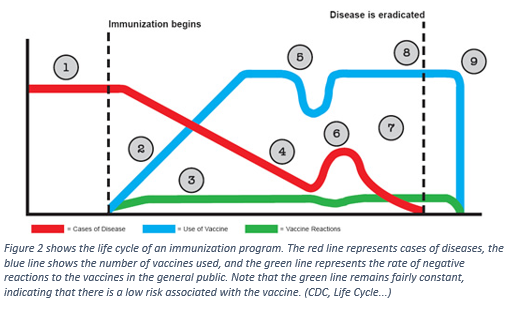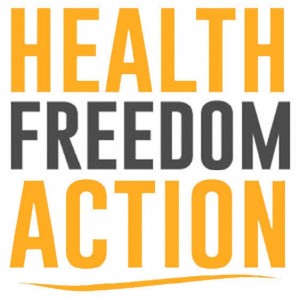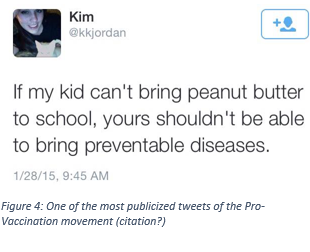Vaccination HCP Rough Draft #1
On June 30th, 2015, Governor Jerry Brown signed into law Senate Bill 277, which mandates all school-aged children to have all their vaccines before starting private school, public school, or daycare. Since the introduction of vaccines, there has been an element of fear and suspicion surrounding immunizations. This culture of fear has many California parents speaking out against this law, claiming that it takes away parental rights regarding choice, and silences free speech. There has been a great deal of misinformation swirling around about vaccines for decades, and no matter how hard scientists try and explain that vaccines are usually one of the safest precautions one can take for their child, there is a growing doubt among the masses. An epidemiologist working at Kaiser Permanente’s Institute for Health Research in Denver, Jason Glanz, said in an interview, "I've also noticed a growing number of parents who are concerned about vaccines. They're skeptical about effectiveness, but even more concerned about safety, despite all this great data to suggest otherwise.” (Verlee). One of the biggest changes that comes with this new law, is the removal of religious or personal belief waivers. Now, if California parents want to exempt their child from vaccines, they must provide a medical reason for doing so. Despite the growing outrage against this law, the goal is to get nearly every school-aged child in California vaccinated, as the state argues that this is a pressing public health issue.
This new legislation came up after an outbreak of measles occurred in Disneyland earlier this year. The disease ran rampant through the amusement park, affecting a total of 147 people across 6 states and even more people in Mexico and Canada were infected (NBC News). Although there were no deaths, this flare-up is what re-sparked a national debate about vaccines, and who has the right to be exempt from them. Many of those affected in Disneyland were not vaccinated due to personal beliefs, and others were simply too young to receive the MMR (measles, mumps, rubella) vaccination (NBC News). California lawmakers agreed that the leniency of the vaccination laws in the state have led to a potentially dangerous consequence. Without strict laws in place to insure that children are getting the prevention they need, the effectiveness of herd immunity begins to diminish. This outbreak was a wake-up call for a lot of people in California, and is one of the reasons behind the urgency of signing this law into action, despite such a strong opposition among parents in the state. California government officials do not want a public health crisis on their hands, but some parents with reservations towards vaccines are wondering if there is truly an imminent threat to their children.
There has been a long history of mistrust and misinformation surrounding the science of vaccines, dating all the way back to the 1100s, when the concept of variolation was thought up in Turkey, China, Africa, and throughout some parts of Europe. This technique inoculated children and adults with small amounts of dried pus and scabs from smallpox victims (Immunize.org). Naturally, people were skeptical of this, because how could direct exposure to an illness so feared and avoided be the treatment needed to prevent contracting such an illness? Nevertheless, the practice of variolation spread, and by the late 1790’s in Great Britain, the Marine Health Service was established to provide care and immunization to the merchants and residents travelling in and out of major port cities, to help prevent the spread of cholera, yellow fever, and smallpox (Immunize.org) The mid-1800s all the way through the late 1900s produced a score of vaccines related to common diseases of the time periods. The studies became more in depth, and the treatments more advanced, and eventually there were vaccines for everything from chicken cholera to tetanus to polio, and everything in between. And yet, there has always been an element of reservation towards these life-saving preventative measures among certain populations. With any medical procedure, there is always some level of risk, and due to the newness of vaccines, it is easy to see why some people were hesitant, not knowing the long term effects, the possible side effects, or the potential damages that could occur. The science, the effectiveness, and the fear of personal risk have all been factors in suspicion around the scientific advancement of vaccines.

This suspicion was heightened in the 1990s, when a controversial paper was published linking vaccines to autism. In 1998, Andrew Wakefield published his paper in the Lancet, a prominent medical journal, in which a group of 12 children were studied after receiving the Measles, Mumps, Rubella vaccine (MMR). It was noted that most of the children developed gastrointestinal issues, and ten of the children were reported to have developed mental issues that were not previously present to being administered the vaccine; these included autism in nine of the children and “disintegrative psychosis,” in one (Wakefield). Understandably, this report caused an uproar among parents, who refused to vaccinate their children for fear of exposing their perfectly healthy children to a high risk of mental and developmental issues. This had seriously detrimental effects, as the vaccination rates in Britain dropped to as low as 80% in the early 2000’s, accompanied by an increase of measles cases (CNN 2011). Due to this strong opposition and fear among parents, and a highly public debate about whether vaccines are safe enough to administer to children at the rate they’re being given at, several more studies were done to determine the validity of the science behind the Lancet paper. The Center for Disease Control in Atlanta, has since then published several studies that disprove the connection between the MMR vaccine and autism. It was discovered that Dr. Wakefield not only made several errors in interpreting the data, but also distorted the medical histories of all 12 of the children in his study. CNN reported in 2011 “…there was ‘no doubt’ that Wakefield was responsible.” In this report, Fiona Godlee, the editor-in-chief of BMJ (British Medical Journal) was interviewed and stated, “…in this case, we have a very different picture of what seems to be a deliberate attempt to create an impression that there was a link by falsifying the data." (CNN 2011). This controversial paper has since been retracted and Dr. Wakefield lost his medical license. Unfortunately, this has not been enough for Anti-Vaccination believers, who are still skeptical of the relationship between vaccines and their risks, and claim that a “one-size-fits-all” method of enforcing vaccines will not work for many families (California’s Coalition for Vaccine Choice).
The Center for Disease Control has released pages and pages of information regarding the safety and effectiveness of vaccines, and an entire section of their website devoted to the discussion of vaccines and autism, linking users to studies done that invalidate the connection between vaccines and autism, along with other serious conditions such as serious reactions to vaccines causing a range of loss of sensory and motor skills. A well known example of this misinformation is 1994 Miss America winner Heather Whitestone, who, according to her mother, is Deaf due to a “reaction to a diphtheria-tetanus shot” she received at 18 months old (Freed, pg. 1895). This was not the case, and her story was clarified by the New York Times after speaking with Ms. Whitestone’s pediatrician: she did not lose her hearing because of this vaccine, but because she contracted Haemophilus influenzae type B meningitis, which incidentally, now has its own vaccine (Freed, pg.1896). There are many parents that want to delay the vaccine schedule, or perhaps completely forego several of the vaccines, because they don’t want to risk overloading their child’s system. However, this is an unnecessary risk; one expert, Dr. Robert Frenck Jr., professor of pediatrics and sits on the American Academy of Pediatrics Committee on infectious diseases, states, “Vaccines have been so effective that people now don't even know what the disease looks like or what problems the diseases can cause,” Frenck states, "[People] don't perceive risk from the disease. They don't perceive the benefits of the vaccine." (Park, CNN 2010). These diseases are now close to being eradicated, parents are even more at risk because the symptoms can easily be mistaken for something less serious, and not get their children treatment in time.

Along with Dr. Frenck, there are hundreds of scientists that are working to prove the validity and safety of modern vaccines; yet there are some leading voices in the anti-vaccination movement that continue to sway parents towards the mistrusting position of the vaccination movement. One of these voices is prominent anti-vaccine advocate Jenny McCarthy, a playboy model turned TV personality that has become the face of the “Anti-Vax” movement. She claims that her son’s autism was caused by the vaccines he received when he was two years old (and continues to believe this even though it has widely been disproven). She has been fighting not for “no vaccinations,” but instead for “safe vaccinations” (PBS), which is a little vague considering all vaccinations have been proven to be safe and effective, otherwise they wouldn’t be given to children.
In addition to McCarthy, Joseph Mercola, a physician of alternative medicine, and a highly controversial presence in the discussion of vaccine effectiveness and safety, Mercola has specifically spoken out against the “over use” of vaccinations in the US, and claims that the ingredients in vaccinations are something for parents to be concerned about. He writes extensively on his website about how vaccines are not the answer to eradicating diseases, but other research has shown that viruses like the small pox have been eliminated due to other western societal enhancements, such as hygiene, nutrition, and isolation of the infected, implying that humans are the reason for declining rates of infectious diseases, rather than vaccines (Mercola). In an excerpt elaborating on Bill Sardi’s “19 Reasons not to vaccinate your children against the flu this season,” one of Mercola’s commentaries was regarding, the adjuvants added to the vaccines: “Adjuvants are added to vaccines to boost production of antibodies but may trigger autoimmune reactions. Some adjuvants are mercury (thimerosal), aluminum and squalene. Why would you sign a consent form for your children to be injected with mercury, which is even more brain-toxic than lead?” (Albeitz). This may sound alarming to parents who are not educated on the topic enough to know what thimerosal is, however the CDC released nine CDC-funded and conducted studies that “have found no link between thimerosal-containing vaccines and ASD (Autism Spectrum Disorder).” (CDC, Vaccines Do Not Cause Autism). Indeed, there is very low risk in administering vaccines to a child, and only in very rare cases does something go horribly wrong. These are only a few examples of the erroneous remarks made by McCarthy and Mercola. While they are leading voices, and passionately fight for their rights to oppose vaccinations, it seems as though their main purpose to this movement is to spread fear and misinformation among confused parents.

So why, after so many studies and proven statistics of declined rates of these diseases, and increased safety precautions, are parents still hesitant? Well, many argue that vaccines are a decision to be made by the parents of the child being vaccinated, and that there is very low risk, considering the general public vaccinates their kids, in allowing exemptions for parents with personal and religious beliefs. However, there is indeed cause for legitimate health concerns, as some parents are hesitant out of fear that the rare side effects of vaccines would happen to their children; “The success of vaccination in reducing the risk of disease has led in recent years to a renewed public interest in and concern about vaccine safety; in the context of minimal risks or contracting vaccine-preventable diseases, the risks of side effects…take[s] on greater weight and needs to be continually reevaluated.” (Ellensberg, 12). The California Coalition for Vaccine Choice advocates claim that these strict regulations are completely unnecessary, and infringe on free speech. Their website condemns this new law, professing:
SB 277 eliminates a parent’s right to exempt their children from one, some, or all vaccines, a risk-laden medical procedure including death. In 2016, California parents will be forced to give their children more than 40 doses of 10 federally recommended vaccines. This open-ended vaccine mandate allows the State of California to add any additional vaccines they deem necessary at any time. The only exemption available is a medical exemption that doctors deny to 99.99 percent of children under federal guidelines.
This information is true, and comes directly out of the proposed Senate Bill. However, vaccine advocates argue that there is no harm in requiring stricter regulations around vaccinations, particularly after the Disneyland scare. California state officials, for the sake of public health, must enforce extreme legislation to insure that California’s kids are safe from preventable diseases. It is also noted on the Coalition’s website that children in this state are vaccinated at percentages above national averages for every vaccine, and cite the California Department of Public Health, to prove that less than 3% of youths have personal belief exemption forms, and that even with the exemption forms, this does not mean that the children are “unvaccinated.” One of the main issues parents are having with the new law SB277, is that there are at least 16 vaccinations required before children begin kindergarten, and if a child has only 15 of the required 16, they will not be allowed to attend school, unless they file the “grandfathered-in” personal belief exemption form, or provide a medical reason for excluding that particular vaccine before January 1st, 2016 (California Coalition for Vaccine Choice).

This to many, seems unnecessarily strict, considering there is no imminent major health crisis in the state, and such a low number of students are already unvaccinated. One prominent voice being heard in a sea of outcries is Chris Thompson, President of Fullerton School District. His quote is featured on the anti-vaccination homepage where he states, “For no reason other than freedom, without prejudice on the pros and cons of various vaccinations both individually and on a broader statistical basis, no citizen should be made to get an injection of anything at the point of a gun. I absolutely oppose this legislation.” The California Coalition also makes another valid point on their website when referencing a bill passed in 2012 called AB2109, which requires parents to seek information regarding “the risks and benefits of vaccines from a healthcare practitioner before filing a Personal Beliefs Exemption.” This current law has effectively educated the public on vaccines, and lowered the rate of exemptions by 19%, and in fact, increased the rate of MMR vaccines.
So as it turns out, “Anti-Vaxxers” are not “Anti-vaccinations,” in the same way that Pro-Choice abortion advocates are not “Pro-abortion.” This Senate Bill can be compared to the 1973 Supreme Court case Roe v Wade, which ruled it unconstitutional to forbid women from access to safe, legal abortions. It is an argument of choice, and forcing parents to inject their children with substances against the parents will, is comparable to forcing a woman to have a baby she doesn’t want to have. Limiting the parent’s options surrounding the health of their child is blatant disrespect for the parent’s right to freedom of speech. However, in the 1905 case of Jacobson v Massachusetts, the Supreme Court ruled that the states did in fact have the authority to enforce compulsory vaccination laws, under the pretense that the freedom of the individual is outweighed by the benefit for the general public (Justia Law). This is the argument for the Pro-Vaccination movement; personal beliefs are fine under circumstances where they don’t affect anyone else’s health or safety. Senate Bill 277 may be one of the strictest vaccine laws passed in the country, but it’s not without justification or necessity. The CDC writes, “Through use of vaccines, we have eradicated smallpox and nearly eliminated wild polio virus. The number of people who experience the devastating effects of preventable infectious diseases like measles, diphtheria, and whooping cough is at an all-time low. To ensure the continued success of vaccines in the United States, it’s crucial to make sure that vaccines are safe.” (History of Vaccine Safety).

With all the controversy surrounding this ongoing debate, it is difficult to know who and what to listen to. There is an overwhelming amount of research to support the fact that vaccines have proven to be safe and effective, there is simply no doubt about that. However, for most people the argument against California’s Senate Bill is not due to the fact that vaccines are wrong or dangerous, the issue is that it takes away parent’s voices. In a Supreme Court case titledPierce v Society of Sisters, the court ruled that “the child is not a mere creature of the state…” (McGough) and that parents have the right to fight for what they believe is in their child’s best interests. This specific case was in relation to public and private education, but the reasoning can be applied to the vaccination debate nonetheless. Senate Bill 277 is not unwarranted, however, it does restrain the right to free speech for thousands of California parents, who only want what is best for their children. There is no doubt that this debate will be ongoing, just as it has been for decades, as scientists and skeptics continue to try and make the other side see the argument from a different perspective.
 icons at the top right corner of the subsection.
icons at the top right corner of the subsection.